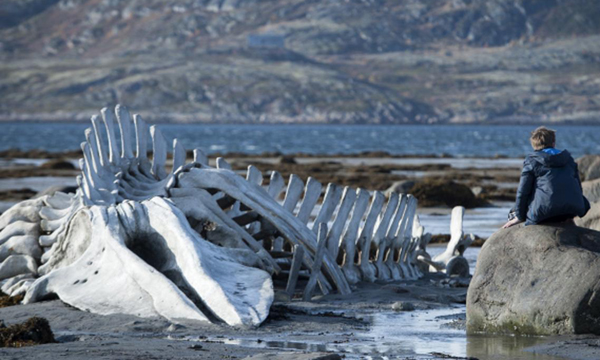By Holly Grigg-Spall.

Andrey Zvyagintsev
Co-writer and director of Russian epic Leviathan Andrey Zvyagintsev won the Palme D’Or for screenwriting at the Cannes Film Festival earlier this year and is now set for the Academy Awards. The film follows the plight of a family struggling to keep their business, home, and land in the face of government power and corruption. It has been described elsewhere as novelistic and like a great HBO show consumed in one sitting. Zvyagintsev’s first feature, The Return took the Golden Lion at the Venice Film Festival in 2003.
Creative Screenwriting spoke with Andrey Zvyagintsev about his film.

Aleksey Serebryakov as Nikolay and Elena Lyadova as Lilya
The screenplay is based on an incident that occurred in Colorado in 2004, how did this story come to you and why did it interest you?
[Marvin John Heemeyer used an armored bulldozer to demolish the town hall and mayor’s house of his town of Granby, Colorado before killing himself with a handgun as the result of a zoning dispute with the local government.]
That was a unique case. I was told the story verbally by a friend. My friend, who was actually part of what happened, told me about how the gates opened and the bulldozer came through the gates and it gave me shivers down my spine. I knew it was a grandiose story. When something shakes you up like that you get the feeling that it’s an unbelievable story. I knew this was the material for a movie. I knew I wanted to have massive amounts of people hear this story. Of course, I wasn’t there, so I only know the story through this friend and others I have spoken to who were there. However, at Cannes I was approached by a Russian journalist who wrote a piece on Marvin John Heemeyer and he interviewed many of the residents of the area. He dealt directly with witnesses to the event, it wasn’t heresay. When he filmed his interviews with them they would state the facts, but when he turned the camera off they would call Heemeyer “the last hero in the United States.” How can you not make a movie about the last American hero?

Mads Mikkelsen in Age of Uprising: The Legend of Michael Kohlhaas, a 2013 film of Henreich Von Kleist’s novella
What came first to you – certain dramatic scenes you wanted to see in a movie or the full narrative?
It was more like a seed. Marvin John Heemeyer was that seed, but I had to grow a whole tree from there to develop the story. There were two options – it could have been filmed as a mockumentary or you could take the facts of the events and evolve the story around it.
I heard the story in New York. Then when I returned to Russia I discovered a book by Henreich Von Kleist, titled Michael Kohlhaas. A horse dealer stages an uprising in the 16th century, takes over a castle. It’s based on a true story. At the end of the book he’s surrounded by the army and he burns down this castle. Throughout time these struggles between people and the powers that be have taken place. We see the same thing in the Bible, in the Book of Job. The story is everlasting.
This novel played a big role in the development of the script for me. In the case of Heemeyer, he was all alone in what he did. There wouldn’t be much of a film if he was just talking to his bulldozer. In the novel the protagonist has a family and friends, and so in the film Nikolay can have a son and a wife and friends so he can bounce his ideas off of them.
It took quite a while. I first heard the story in Spring 2008 and the first version of the script was completed in Winter 2011, so it took almost three years. As soon as I came home I spoke to Oleg Negin (the co-writer), I told him the story and he wasn’t sure why I was suggesting this. He didn’t want to make a movie about vandalism. After many months of talking everything came to fruition. He was worried at first that it was about a useless uprising. He didn’t want to provoke something like that when people could be hurt.
The story of Leviathan involves multiple layers, from the attorney who is Nikolay’s childhood friend who betrays him, to his wife who in her despair takes a certain path. I wanted to widen one person’s struggle against the system and make it a group’s struggle against the system.
Does the film counter any assumptions Americans might have about Russia?
I don’t think a single movie can attempt to represent the beauty, the differences, the multi-layers of a country. This is just one side, it’s one portion. The country is huge and rich in its human potential. It has 140 million people. It’s like a crystal in that you see different facets from every turn. I could just show slices of the experience. In Russia I am sure there are people who say that this film is not true and this does not happen, and either those people are lying to themselves or they are happily living in a different reality.

Aleksey Serebryakov as Nikolay
What do you see as the role of the filmmaker?
I like to see movies that expose the truth. The job of the artist is to show things as they are, to take a critical look, but not to sway opinion. This film is critical, but it’s also an objective and sober look at reality.
